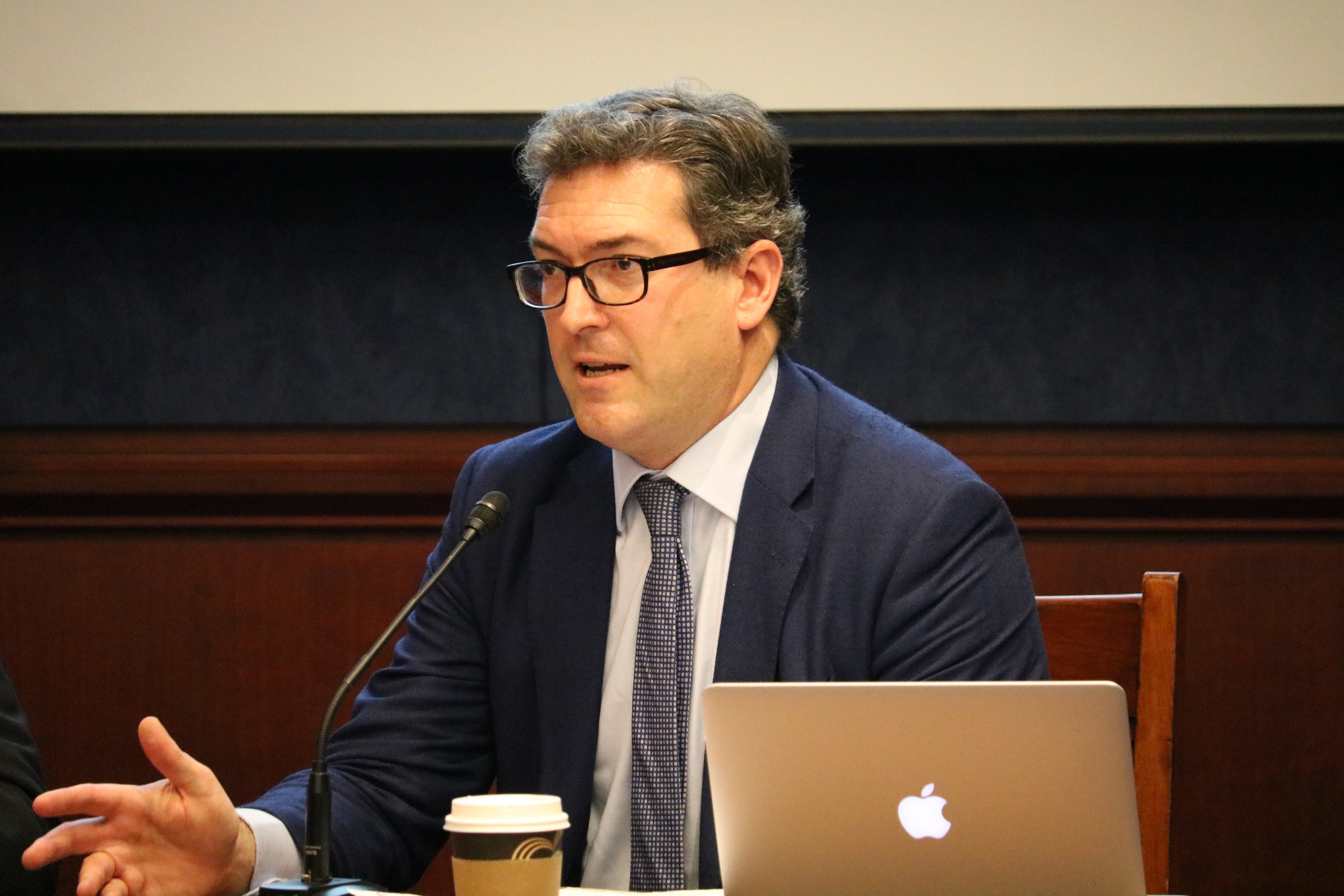Burma’s latest wave of religious and ethnic cleansing against its Muslim Rohingya community is, unfortunately, indicative of that nation’s broader religious freedom and human rights challenges. Indeed, Burma’s religious and ethnic minority communities have known little peace for over a half century.
Benedict Rogers highlighted the current violence against the Rohingya Muslims and the broader religious freedom and human rights challenges in Burma. Photo: RFI/Luke Adams
The latest crisis escalated in August 2017 and has led to the destruction of hundreds of villages and the murder and rape of thousands. Many around the world have been appalled at these acts as the persecution has also forced the displacement of over 600,000 people, most of whom have fled across the border into Bangladesh.
Sadly, these recent events are only a continuation of the violence and discrimination Rohingya Muslims have faced for decades. In 1982, the Burmese government stripped the Rohingya of their citizenship, rendering them stateless and vulnerable to increasingly severe restrictions on their basic human rights. Major violence broke out against the Rohingya again in 2012, and a military offensive began displacing thousands in October 2016.
This latest military campaign against the Rohingya has been the most severe and widespread, forcing hundreds of thousands to join those already living in squalid conditions in Bangladeshi refugee camps. These refugees have become a people without a country, for neither Burma nor Bangladesh recognize the Rohingya as citizens. As one Rohingya refugee said: “The Bangladesh authorities say we are from Burma. The Burmese regime says we are Bengali. We are trapped between a crocodile and a snake. Where should we go?”
Zeid Ra’ad Al Hussein, the U.N. High Commissioner for Human Rights, has described the crisis as a textbook case of ethnic cleansing. He would not be surprised if courts were to conclude this round of persecution includes acts of genocide. Such opinions are not offered lightly by high‑ranking U.N. officials and thus suggest the gravity of the atrocities committed against the Rohingya.
At a February 8 Capitol Hill briefing for policy makers and representatives of U.S.-based NGOs, I offered analysis of the crisis and recommendations for what civil society organizations and policy makers can do in response.
First, as one participant in a conflict-resolution training course I led in Burma not long ago observed, “Conflict starts with misunderstanding.” This observation is particularly relevant today in Burma where years-long propaganda campaigns against Muslims have created widespread distrust between communities.
While the campaign against the Rohingya Muslim community is the largest in scale, targeting of other ethnic and religious minorities is also prevalent in Burma. As an example, when simmering hostilities flared along ethnic and religious lines in late January, the Burmese military once again launched airstrikes targeting minority communities in Kachin and Shan states, leading to civilian casualties and displacement.
During the course of my work in Burma, I have built trust-based relationships with Buddhist monks to counter religious intolerance in Burma. These efforts have included facilitating their dialogue with Muslim clerics to begin breaking down misunderstanding and equipping both communities to understand better the inter-religious conflicts they have long experienced. Similar ongoing efforts by both local and global religious leaders will be crucial for addressing these religiously and ethnically linked conflicts.
Second, the international community needs to increase its humanitarian response for refugees who have fled to Bangladesh, particularly as the monsoon season approaches.
While most Rohingya express a desire to return to Burma where they have a deep sense of belonging, this is not without challenges. A successful return is one where the safety of the refugees is guaranteed. This includes physical safety as well as the protection of fundamental rights, true citizenship, and the ability to secure meaningful work to support themselves and their families. With these major challenges present, the international community must ensure that repatriation of Muslim Rohingya only occurs voluntarily and securely—and that there is an international presence in Rakhine State to monitor their safety and provide humanitarian assistance.
Finally, there is a role for targeted measures to help punish perpetrators and secure justice for their victims. These may include sanctions, such as those the U.S. government levied in December against Burmese General Maung Maung Soe for his role in recent atrocities. In another hopeful sign, the bipartisan Burma Human Rights and Freedom Act of 2017 (S. 2060) now under consideration in the U.S. Senate would sanction the Burmese military for its acts of persecution against the Rohingya. Introduced by Sen. John McCain (R-AZ), the bill’s co‑sponsors currently include thirteen Democratic Senators.
While ensuring they are carefully designed to avoid harming the broader population, sanctions and other punitive actions against those responsible for these appalling acts of persecution are essential steps for the international community to take to protect Burma’s Rohingya Muslims.
Benedict Rogers is East Asia Team Leader at Christian Solidarity Worldwide and a Senior Fellow of the Religious Freedom Institute. He is the author of three books on Burma, including “Burma: A Nation at the Crossroads” (Random House UK, 2016). The text reflects the analysis and recommendations Rogers offered at his February 8 Capitol Hill briefing, “Responding to Religious Intolerance, Ethnic Cleansing and Crimes Against Humanity in Burma: A Humanitarian and Human Rights Crisis.”
THE RFI BLOG

Does Southeast Asia Lead the World in Human Flourishing?

RFI Leads Training Session on Religious Freedom Law and Policy for U.S. Army War College

Oral Argument in Charter School Case Highlights Unconstitutional Motives Behind OK Attorney General’s Establishment Clause Claim

Largest Longitudinal Study of Human Flourishing Ever Shows Religion’s Importance

Keys To Human Flourishing: Faith And Relationships Outweigh Wealth
CORNERSTONE FORUM

Reaffirming Religious Freedom: Bridging U.S. Advocacy and Iraq’s Constitutional Framework

Political Polarization, Same-Sex Marriage and Religious Liberty

Bridging the Gap Between International Efforts and Local Realities: Advancing Religious Freedom in the MENA Region

Challenges to Religious Freedom in Iraq and the Critical Need for Action


